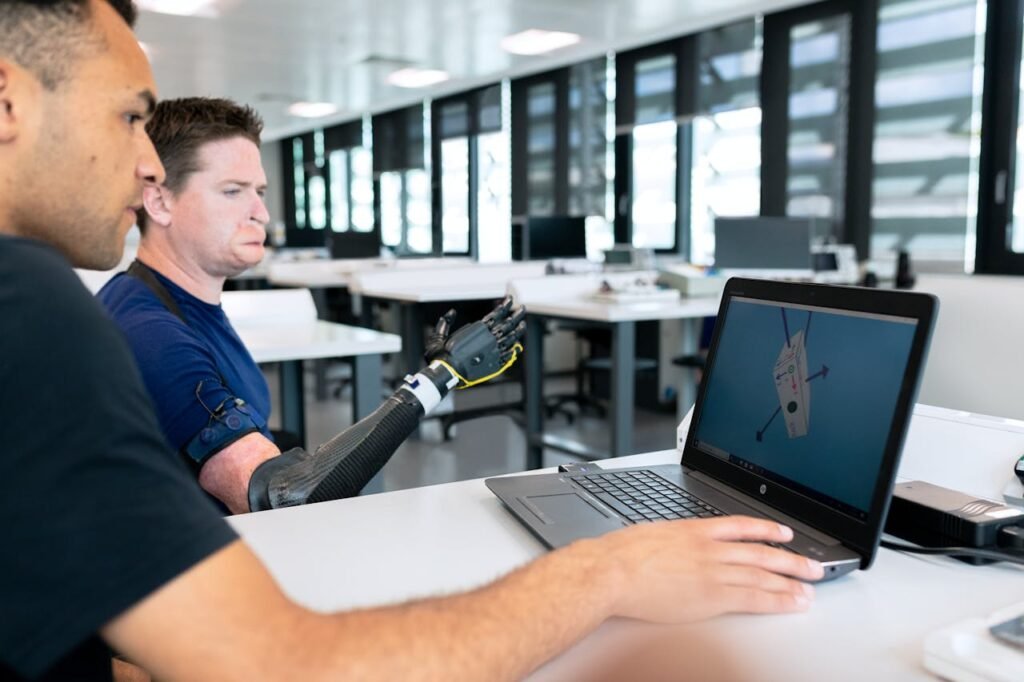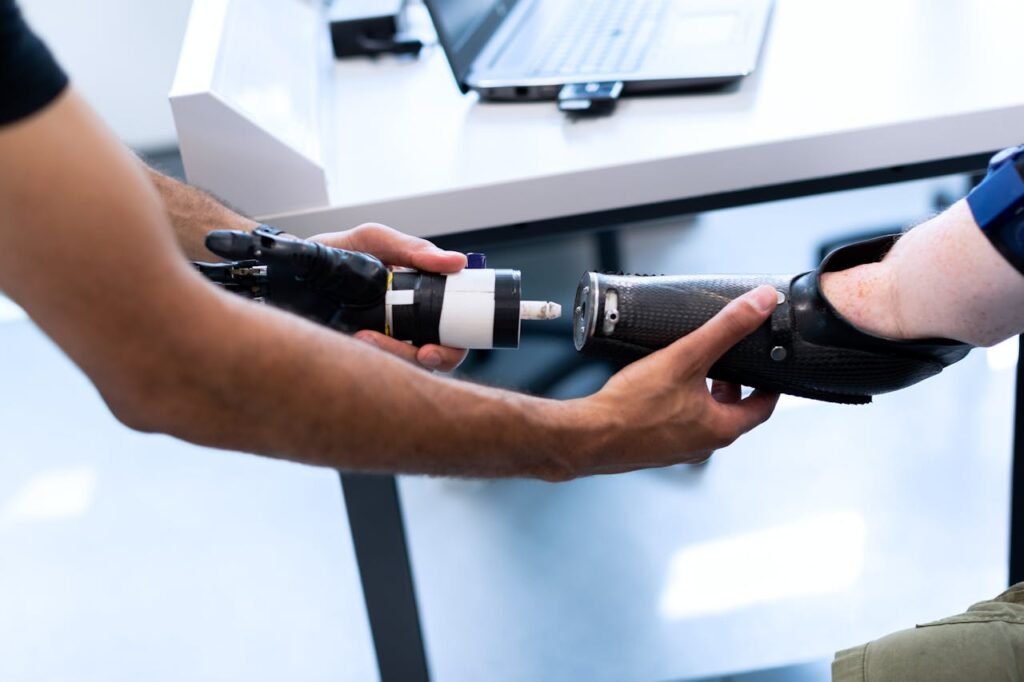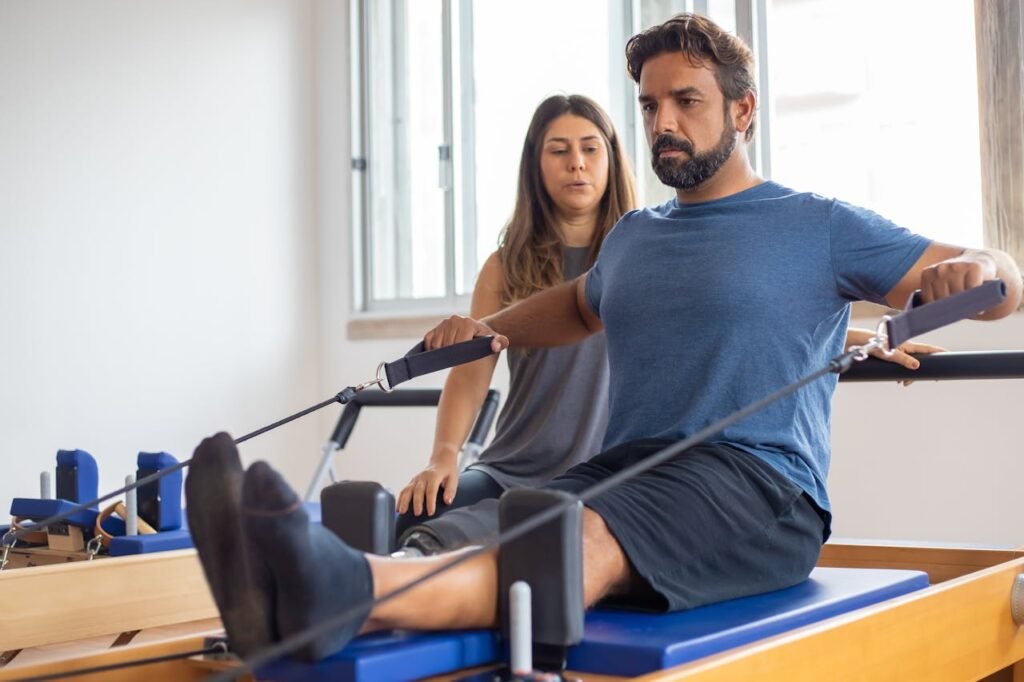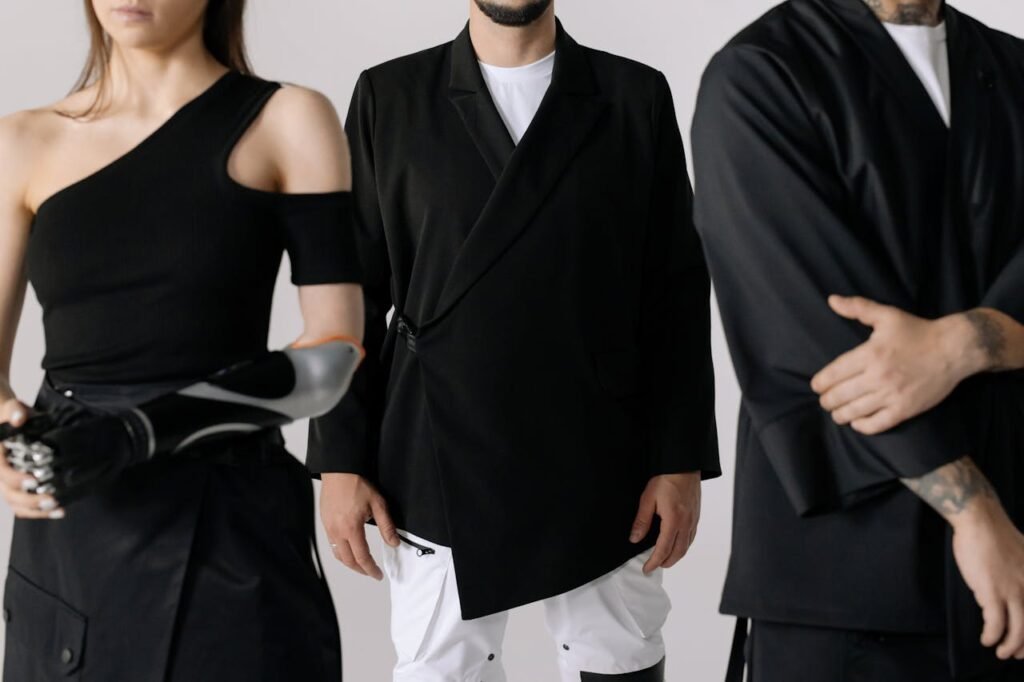Relationships and dating are an essential part of life. They bring joy, connection, and a sense of belonging. For people with disabilities, however, navigating these experiences can sometimes feel daunting due to societal misconceptions, personal insecurities, or physical barriers. But love and connection are universal—they belong to everyone. With the right mindset and strategies, building meaningful relationships and enjoying fulfilling romantic experiences is entirely possible.
At Robobionics, we’re dedicated to empowering individuals with disabilities to live fully and confidently. Whether it’s through advanced prosthetics like Grippy™ or tools that support independence, we believe that your disability should never limit your ability to connect and thrive in relationships.
Embracing Your Confidence and Self-Worth
The foundation of any strong relationship starts with self-acceptance. Feeling confident in who you are allows you to approach relationships with authenticity and openness.
Redefine How You See Yourself
Disability can sometimes influence self-perception, leading to doubts or fears about whether you are “enough.” These feelings, while common, can overshadow the incredible qualities you bring to a relationship. Remember that your disability is just one part of who you are—it does not define your worth or capacity for love.
Start by focusing on what makes you unique. Are you empathetic, funny, ambitious, or creative? These are the qualities that truly matter in relationships. Acknowledging and celebrating these traits can help you shift the narrative and view yourself with pride.
Overcoming Insecurities
It’s natural to feel nervous about opening up to someone, especially when addressing topics like your disability. These insecurities can make you hesitant to put yourself out there. However, vulnerability can also be your greatest strength. Sharing your journey and challenges allows others to see your courage and resilience.
If you’re learning to adapt to a new prosthetic or managing ongoing rehabilitation, involve your partner in the process. For example, invite them to a rehabilitation session or show them how devices like Grippy™ enhance your daily life. This openness can deepen trust and understanding.

Communicating Openly in Relationships
Clear communication is the cornerstone of any relationship, whether it’s romantic or platonic. It’s even more critical when navigating the unique dynamics of dating with a disability.
Being Honest About Your Needs
When starting a relationship, being upfront about your disability and any accommodations you may need is important. You don’t have to disclose everything at once, but sharing your story in your own time helps set the stage for mutual understanding.
For instance, you might explain how a prosthetic helps you complete tasks or mention adjustments that make outings more comfortable. Honesty fosters trust and ensures that your partner doesn’t feel like they’re in the dark about something important.
Setting Boundaries
Every relationship requires boundaries, and this is no different when living with a disability. Whether it’s physical limitations, emotional triggers, or energy levels, communicating these boundaries ensures a relationship built on respect and consideration.
For example, if certain activities are exhausting or challenging, let your partner know early on. This isn’t about limiting experiences but finding ways to enjoy shared activities that work for both of you.
At Robobionics, we emphasize this balance during our prosthetic trials and gamified rehabilitation programs. These tools can help you identify what works best for your daily life, ensuring you feel empowered in every situation.
Navigating Expectations in Dating
Dating is a process of discovering compatibility, understanding each other’s values, and building a connection. When living with a disability, managing expectations—both your own and your partner’s—is essential for creating a healthy foundation.
Understanding Your Own Expectations
Before stepping into the dating world, take time to reflect on what you want in a relationship. Knowing your expectations helps you approach dating with clarity and confidence.
Also, consider how your disability may influence your relationship needs. For instance, if you rely on certain accommodations or adaptive devices like a prosthetic, think about how a potential partner might support you in these areas. Remember, asking for understanding or assistance is not a weakness—it’s part of fostering a meaningful bond.
Addressing Potential Biases
When dating, you may encounter people who have preconceived notions about disabilities. Some might focus too much on your disability, while others may overlook it entirely in an attempt to avoid awkwardness. Both extremes can feel isolating, but they also present an opportunity to educate and advocate.
Gently address biases when they arise. For example, if a date assumes you’re unable to do something, correct them with kindness: “Actually, I do that all the time. My prosthetic makes it pretty seamless.” By showing how you navigate life confidently, you can help break down stereotypes and foster understanding.
Deepening Emotional Connections
Building a strong emotional bond is at the heart of any relationship. For individuals with disabilities, this often involves a deeper level of vulnerability and trust, which can strengthen the connection over time.
Sharing Your Journey
Every person has a unique story, and your journey with your disability is an important part of yours. Sharing your experiences—both the struggles and triumphs—can create a deeper sense of intimacy. It helps your partner understand what shapes you as a person and allows them to appreciate your resilience and adaptability.
For instance, if you’ve recently started using a prosthetic like Grippy™, talk about the learning curve, how it has enhanced your independence, and what it means for your future. This level of openness invites your partner to become a part of your journey.

Recognizing Emotional Availability
Emotional connections thrive on mutual vulnerability. While it’s important to share your story, it’s equally vital to understand your partner’s experiences and emotions. Relationships are a two-way street, and creating space for your partner’s feelings strengthens the bond.
Ask questions, show empathy, and listen without judgment. This dynamic fosters equality in the relationship, ensuring that both partners feel valued and understood.
Tackling Societal Biases Together
Unfortunately, societal biases about disabilities can sometimes affect relationships. These biases might come from external sources, like strangers, or even from within your partner’s social circle. Facing these challenges together strengthens your partnership and demonstrates your resilience as a team.
Dealing with Public Perceptions
It’s not uncommon to encounter stares, questions, or unsolicited comments when out in public. While these moments can feel uncomfortable, they also provide an opportunity to educate. If someone asks an inappropriate question, respond calmly: “Thank you for asking, but I prefer not to talk about that right now.”
Your partner’s response in these situations is also important. A supportive partner will stand by your side and respect your comfort level. Discuss these scenarios beforehand to ensure you’re on the same page about how to handle public interactions.
Building Supportive Social Circles
Sometimes, societal bias can come from friends or family who aren’t fully informed about disabilities. This can be particularly challenging, as these are people whose opinions might matter to you or your partner.
Approach these situations with patience. If a comment is made out of ignorance rather than malice, educate gently: “I know you might not have experience with this, but it’s important to us that we’re treated like any other couple.” Encourage your partner to advocate for you in their circles as well.
Maintaining Independence in Relationships
A healthy relationship thrives when both partners maintain their individuality while sharing a strong bond. For someone with a disability, fostering independence is not only empowering but also essential for mutual respect in the relationship.
Prioritizing Your Personal Goals
Your ambitions and passions are a significant part of who you are. Whether it’s advancing in your career, learning a new skill, or pursuing a hobby, dedicating time to your personal growth demonstrates confidence and self-reliance.
If your disability impacts how you achieve certain goals, adaptive tools and solutions can bridge the gap. For instance, advanced prosthetics like Grippy™ are designed to help you perform daily tasks with ease, allowing you to focus on what truly matters.
By prioritizing your growth, you show your partner that your relationship enhances your life rather than defining it.
Balancing Support and Independence
While support is a cornerstone of relationships, it’s important to strike a balance between accepting help and asserting your independence. Relying on your partner for emotional and physical support is natural, but being proactive in managing your own needs ensures you maintain a sense of agency.
For example, if you use a prosthetic and need regular maintenance, schedule appointments independently. At Robobionics, we provide quick and efficient repair services to ensure your prosthetic is always in top condition.

Cultivating a Partnership of Equals
Independence in relationships begins with recognizing and valuing each partner’s unique strengths and contributions. For individuals with disabilities, this means embracing the ways in which they enrich the relationship while ensuring they aren’t overly dependent on their partner for day-to-day activities.
A key strategy is proactive communication about roles and responsibilities. For example, a partner might assist with tasks that are genuinely challenging due to physical limitations, but it’s important to balance this with tasks the individual can handle independently. This creates a dynamic where both partners feel they are contributing equally, fostering mutual respect.
Empowering Self-Reliance Through Technology
Modern technology has transformed what independence looks like for individuals with disabilities. Adaptive devices and smart tools make it easier to manage tasks, solve problems, and maintain control over one’s life.
For example, prosthetics equipped with sensory feedback allow users to perform fine motor tasks, enhancing their ability to participate in hobbies or professional roles without assistance.
Businesses that develop these technologies should actively educate users and their partners on how these tools enhance independence. A robust onboarding program or instructional guides tailored for couples can ensure that both parties understand the device’s potential and feel empowered to integrate it into their lives.
At Robobionics, we offer personalized consultations that demonstrate how products like Grippy™ can fit seamlessly into your lifestyle.
Balancing Emotional Independence with Connection
While physical independence is essential, emotional independence is equally important in a healthy relationship. This involves maintaining a strong sense of self-worth and the ability to self-soothe during times of stress, rather than relying solely on a partner for emotional stability.
For businesses in the disability sector, offering programs that promote mental and emotional well-being is a strategic way to support independence.
Gamified rehabilitation, for example, not only helps users adapt to prosthetics but also fosters a sense of achievement and emotional resilience. These tools can be a springboard for individuals to approach relationships with a stable and positive mindset.
Navigating Intimacy with Confidence
Physical and emotional intimacy are vital parts of romantic relationships. While they can sometimes feel challenging to navigate when living with a disability, open communication and mutual trust pave the way for meaningful connections.
Building Comfort Through Communication
Intimacy starts with conversation. Share your feelings, preferences, and any concerns with your partner to build a foundation of understanding. For instance, if certain physical actions are uncomfortable due to your disability, explain this to your partner and explore alternatives together.
Mutual exploration can deepen your bond. Approach these discussions with curiosity rather than fear. When both partners feel heard and respected, intimacy becomes a shared experience rather than a source of stress.
Focusing on Emotional Connection
While physical intimacy is important, emotional intimacy often plays an even greater role in creating a strong connection. Take time to nurture your emotional bond by expressing affection, sharing dreams, and supporting each other during challenging times.
Disabilities can sometimes enhance emotional intimacy by fostering deeper levels of trust and understanding. Use this to your advantage by embracing vulnerability as a strength rather than a limitation.

Emphasizing Comfort and Trust as a Foundation
Intimacy thrives in an environment of trust and mutual understanding. For individuals with disabilities, the process of establishing trust may include discussing how their disability affects certain physical or emotional interactions. This can range from explaining physical limitations to clarifying any necessary adjustments that enhance comfort.
Businesses catering to individuals with disabilities, such as Robobionics, can help create this foundation by providing educational content or workshops that normalize these conversations.
For example, a guide about how prosthetics like Grippy™ can improve physical interaction could encourage users and their partners to explore intimacy with greater confidence. When tools are framed as enablers of connection rather than barriers, they become bridges to deeper relationships.
Encouraging Exploration of New Dynamics
Intimacy is not a static experience; it evolves as partners learn more about each other. For couples where one partner has a disability, exploring new dynamics is an essential part of maintaining a fulfilling relationship. This could mean discovering new ways to show affection, reimagining physical closeness, or finding creative methods to adapt to physical challenges.
For instance, a user of a prosthetic limb might initially feel unsure about how it affects touch or movement in intimate settings. Businesses can offer solutions by designing prosthetics that mimic natural movement or provide sensory feedback, making interactions feel more intuitive and natural.
Additionally, hosting open forums or webinars where couples share experiences can inspire others to embrace intimacy in innovative ways.
Addressing Emotional Intimacy in Parallel
Physical intimacy often takes center stage in discussions, but emotional intimacy is equally vital. Disabilities can sometimes lead to insecurities or feelings of vulnerability, making emotional connection even more important. A partner who listens without judgment, validates feelings, and engages in meaningful conversations helps create an emotional bond that supports physical closeness.
Businesses like Robobionics can contribute by emphasizing holistic well-being in their offerings. For example, rehabilitation programs could incorporate activities that encourage partners to participate together, fostering a deeper emotional connection while adapting to new technologies or routines. When emotional intimacy is nurtured, physical intimacy becomes a natural extension of the relationship.

Building a Lasting Partnership
A successful relationship requires effort, commitment, and mutual respect. By addressing challenges together and celebrating each other’s strengths, you can create a partnership that stands the test of time.
Celebrating Shared Achievements
Relationships flourish when both partners feel valued and appreciated. Celebrate milestones, both big and small. Whether it’s adapting to new circumstances or reaching a shared goal, acknowledging these moments strengthens your bond.
For instance, if you’ve recently started using an advanced prosthetic like Grippy™, involve your partner in your progress. Show them how it’s improved your independence and share your excitement about future possibilities.
Embracing Challenges as a Team
Every relationship faces challenges, and living with a disability may introduce unique ones. The key is to approach these obstacles as a team rather than individuals. Discuss potential difficulties openly, brainstorm solutions together, and celebrate the resilience you build as a couple.
A supportive partner will recognize that love and commitment go far beyond physical abilities. They’ll stand beside you, not out of obligation, but because they value you for who you are.
Establishing a Shared Vision
A successful relationship often thrives when both partners align on long-term goals. While each individual should maintain personal aspirations, discussing shared dreams—such as where you’d like to live, how you’d handle financial responsibilities, or the type of support you envision in challenging times—strengthens the bond.
For individuals with disabilities, these discussions may also include how evolving needs, such as the integration of assistive technology, might play a role in achieving these goals.
Businesses serving individuals with disabilities, such as Robobionics, can help foster these conversations by providing tools and resources that cater to both partners.
For instance, explaining how devices like Grippy™ enhance daily life allows both partners to envision a shared future where independence is celebrated. When one partner supports the other’s use of adaptive technology, it deepens the sense of collaboration and partnership.

Reframing Challenges as Growth Opportunities
Challenges in relationships, while inevitable, are often opportunities for growth when approached with the right mindset. For couples where one partner has a disability, obstacles such as accessibility concerns, societal misconceptions, or unique lifestyle adjustments may arise. Reframing these hurdles as areas where growth and innovation can occur leads to solutions that strengthen the partnership.
For example, a couple might face difficulties planning a vacation due to accessibility concerns. Instead of viewing this as a barrier, they could work together to research destinations and accommodations that meet their needs. This collaborative approach transforms a potential frustration into an exercise in teamwork, communication, and shared achievement.
Enhancing Emotional Resilience as a Couple
Emotional resilience is a cornerstone of lasting relationships. It involves the ability to face adversity together and emerge stronger. For couples navigating the dynamics of a disability, resilience often comes from understanding, empathy, and a shared commitment to facing challenges head-on.
One way to foster resilience is to engage in regular, open conversations about emotions, expectations, and any evolving needs. For example, if one partner is adjusting to a new prosthetic or undergoing rehabilitation, discussing how this impacts their day-to-day life—both physically and emotionally—helps the other partner understand and provide meaningful support.
Conclusion
Managing relationships and dating with a disability may come with its own set of challenges, but it’s also an opportunity to form deeper, more meaningful connections. By embracing your confidence, communicating openly, and fostering independence, you can build relationships that enrich your life.
At Robobionics, we understand the importance of empowerment in every aspect of life, including love. Our advanced prosthetics, rehabilitation programs, and ongoing support are designed to help you live with confidence and independence.
Love knows no limits. With courage, communication, and the right support, you can navigate the journey of relationships with pride and joy. Would you like to refine any sections or explore specific topics further?



